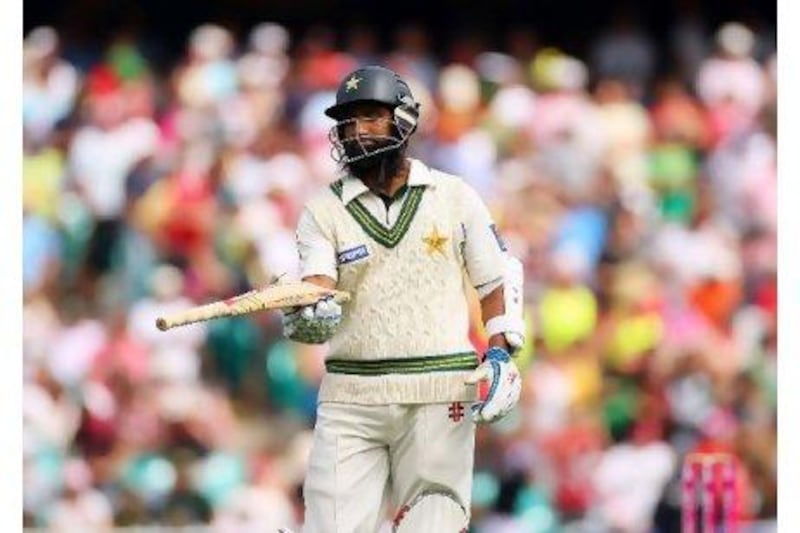The Pakistan Test squad announced for the upcoming tour to New Zealand had one surprising omission: Mohammad Yousuf, the experienced batsman.
Yousuf's exclusion, apparently for lack of fitness, is unwarranted.
The fitness excuse seems somewhat contrived given there is more than ample time for Yousuf to prove he is in good shape before the New Zealand tour commences on January 7.
The Pakistan squad was announced on November 30 so Yousuf had five weeks to fully recover from a minor groin injury.
In the past, the Pakistan Cricket Board (PCB) has provisionally selected even fringe players for tours subject to them clearing fitness tests, so it is bizarre that a similar approach was not applied to a player with Yousuf's record.
The only logical explanation would be that the PCB has yet again decided to close the curtains on an illustrious career. Is this finally the end of the road for Yousuf?
It is difficult to fathom the PCB's logic, or what passes for it, at the best of times, but one suspects that the PCB feels, quite erroneously, that Yousuf has been involved in one controversy too many.
It is sad if they have taken this decision as Yousuf is one of the few recent Pakistan players whose honesty and integrity on the field is above reproach and who, along with Younus Khan, should be the fulcrum of a "clean" and "controversy-free" Pakistan Test side for the next 12 months.
That Yousuf still has something to contribute to the Pakistan team should not be in doubt. His mere inclusion in the squad during this summer's tour to England boosted the confidence of Pakistan batsmen and the younger players such as Azhar Ali and Asad Shafiq benefited enormously from his calming influence at the crease and in the dressing room.
His last international outing before this summer was in the ill-fated tours to New Zealand and Australia a year ago, low-scoring encounters where Yousuf often appeared to be the best batsman from either side. He was timing and hitting the ball beautifully, and with a bit more luck, would have scored much more heavily than he did.
So citing a lack of form as a reason to axe Yousuf simply does not wash. Yousuf is experienced in the difficult batting conditions in New Zealand, and averages an impressive 55 in his previous eight Tests there.
It would be a travesty if Yousuf's remarkable career, in which he achieved so much for his team and country, ends in such inglorious circumstances. There have been some brilliant highs over the last 12 years, where Yousuf's class saved the frail Pakistan batting line-up time and time again.
The numbers tell their own story: 7,530 runs in 90 Tests, at a hugely impressive average of 52.29, and 9,720 one-day international runs at an average of 41.71.
Yousuf has scored those runs in style and his batting has always been a treat for connoisseurs. The silken touch, the wonderful timing, and the supple wrists made him one of the most watchable of modern-day batsmen.
Coming from a poverty-stricken background and a minority community, Yousuf has faced formidable obstacles all his life.
Despite his phenomenal ability, he only began his first-class career at the relatively ripe old age (in Pakistani context) of 22, as earning money to feed his family was more of a priority than participating at cricket trials and camps.
He had neither the financial means nor the family connections that are often needed by young cricketers in Pakistan; just an abundance of talent, and it was talent alone that eventually led to a belated international debut when he was almost.
He has not looked back since, scoring mountains of runs in all conditions and against all manner of opposition.
Some of his best knocks were scored when the going was tough; back to back centuries against a rampaging West Indian attack spearheaded by Curtly Ambrose and Courtney Walsh on their home turf in 2000; fighting knocks facing Australia's Glenn McGrath and Shane Warne in 1999 and in 2004; match-winning centuries and double centuries against England's high-quality, Ashes winning pace attack of Matthew Hoggard, Steve Harmison and Andrew Flintoff in 2005 and in 2006; and match winning contributions in difficult conditions in New Zealand in 2003, in Zimbabwe and in India.
Like most modern-day Pakistan greats, Yousuf's career has not been without controversy. There is the well-known defection to the Indian Cricket League (ICL) in 2007, but Yousuf was hardly the only player who played in the ICL.
His decision to play in the ICL was an understandable reaction to the PCB's bizarre and politically motivated refusal to select him for the Pakistan team, despite having scored more runs in a calendar year than any other batsmen in cricket's 130 year history. Instead of lauding such a remarkable talent and building a team around him, the PCB chose to ban him for his ICL defection, and Pakistan cricket lost two of Yousuf's best years as a batsman.
Things have been difficult for him since his return from the ICL ban, exacerbated by the PCB's mindless and inept banning of the best Pakistan players, and employing a strategy inspired by a game of musical chairs to award the Test captaincy.
PCB's poor man management is ultimately to blame for Yousuf's poor returns of late; both Younus and Yousuf should have been the linchpins of the team.
What next then for Yousuf's rags to riches story? He has been a remarkable servant of Pakistan cricket and while a way back into the side appears to be blocked, Yousuf has done it before, most remarkably at the outset of his career.
Many would have considered the chances then to be insurmountable, but Yousuf's determination, desire and talent have brought him thus far; they may yet take him further.






